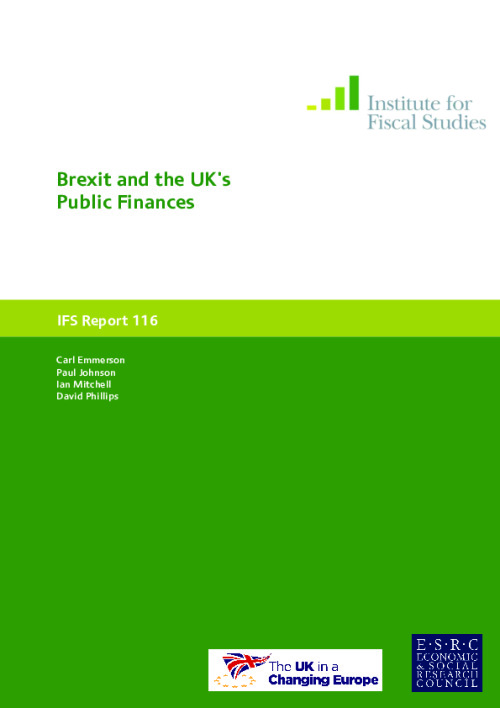If the result of the referendum on 23 June leads to the UK leaving the EU, there will be impacts on the UK public finances. This report aims to set out the possible impacts, focusing particularly on the short run, given that the Chancellor wishes to achieve a budget balance by the end of this parliament. We also look at possible long-run consequences.
The overall impact on the public finances will depend on two distinct components, each of which is uncertain to some degree:
- The mechanical effect. As a net contributor to the EU, leaving the EU would strengthen the public finances because our net contribution would fall. But given uncertainty over the form of any subsequent arrangement with the EU, it might not necessarily fall to zero.
- The national income effect. Any effect of leaving the EU on UK national income would affect the public finances. A rise in national income would strengthen the public finances, a fall would weaken them.
We find that the mechanical effect of leaving the EU would be to improve the UK’s public finances by in the order of £8 billion – assuming the UK did not subsequently sign up to EEA or an alternative EU trade deal that involved contributions to the EU budget. However, there is an overwhelming consensus among those who have made estimates of the consequences of Brexit for national income that it would reduce national income in both the short and long runs. The economic reasons for this – increased uncertainty, higher costs of trade and reduced FDI – are clear. The only significant exception to this consensus is ‘Economists for Brexit’.
In the short run, our estimates therefore suggest that the overall effect of Brexit would be to damage the public finances. On the basis of estimates by NIESR, the effect could be between £20 billion and £40 billion in 2019–20, more than enough to wipe out the planned surplus. In the long run, lower GDP would likely mean lower cash levels of public spending.
To put this in context, dealing with the public finance effect would require at least an additional one or two years of ‘austerity’ – spending cuts or tax rises – at the same rate as we have experienced recently to get the public finances back to balance (should that remain the government’s priority). Following this path would also mean government debt remaining higher than otherwise, and additional debt interest payments.
These are important costs that would mean difficult decisions on tax, benefits and public services, but are not unmanageable if we wanted to pay them. The fiscal effects of leaving the EU would, of course, be only one part of the wider economic, social and political impacts of Brexit, all of which need to be taken into account.












